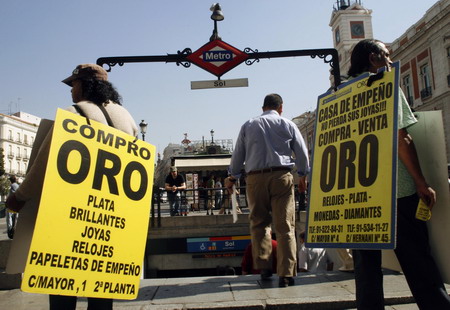MADRID -- Beneath the clock in Madrid's Sol square where Spaniards gather to count in the New Year, it's an increasingly common sight: men walking around wearing sandwich boards or luminous jackets saying "I buy gold."

Men advertise pawn shops at Madrid's landmark area of Puerta del Sol October 2, 2008. Besides pawnbrokers, cobblers, betting shops and cheap mobile phone services are doing a good trade as consumers become more thrifty and companies across most of Spain's struggling economy slash jobs and investment. [Agencies]
|
Echoing images of men in sandwich-boards that encapsulated the hard times of the Great Depression, in Spain immigrants or people laid off from construction are picking up a small daily rate working as advertisers for pawnbrokers.
Whereas the Depression-era archetype often wore a raincoat and trilby and his board proclaimed his war service and hardship, the men in Madrid dress casually and advertise for bosses ready to buy gold and jewellery.
Besides pawnbrokers, cobblers, betting shops and cheap mobile phone services are doing a good trade as consumers become more thrifty and companies across most of Spain's struggling economy slash jobs and investment.
In and around Madrid's central, landmark square Sol, the men hand out leaflets and show potential customers the way to pawnbrokers' premises, many of them in upper-floor flats.
"The other day a woman came by with a whole bag of gold," said David Santos, a 38-year-old man wearing a sandwich board. "She said she had missed payments on her mortgage and was going to lose her house."
"A business-owner came the other day with four Rolexes to pawn," said Jose Bautista, a 45-year-old Dominican working nearby. "He got 18,000 euros. He did it to do the right thing and pay his workers."
Walking advertisers are paid around 30 euros ($39) a day and do not get commissions, but with unemployment in Spain at almost 13 percent -- by far the rate in the European Union, according to EU figures -- many are willing to fill the posts.
"There are eight to nine of us in (Calle) Arenal, five in Montera, here there are three and on that corner there are two," said Bautista.
He and Santos said some customers are gypsy families. Customers are paid 9-13 euros per gram, depending on whether they sell their gold objects outright or just pawn them: they get less if they want up to three months to reclaim the goods.
That price compares with a value for gold on world markets of about 19 euros per gram in early December.
"All classes of people come here," said Santos, who used to work as a security guard on construction sites. "There are people who pull up in Mercedes who are very well dressed and have to pawn things and others who you say haven't got two pennies to rub together, but they have gold."

